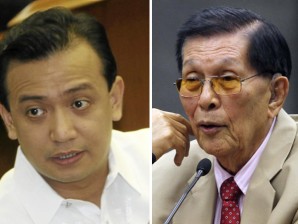Enrile, Trillanes resume word war
Just when everyone thought the smoke had cleared, Senate President Juan Ponce Enrile and Sen. Antonio Trillanes IV have gone at it again.
This time, Enrile said he would bare the truth about Trillanes during next year’s campaign—a move the Senate President believes would cost his young colleague his reelection bid.
Trillanes, in turn, dared the chamber’s oldest member to attend a seminar on public policy he was willing to conduct after Enrile accused him of copying an old bill on the country’s baselines territory that Enrile had authored.
The word war that began three weeks ago was apparently rekindled by rumors that Trillanes was behind a white paper that was circulated last week listing Senate reporters allegedly on the take from Enrile.
Hard copies of the list were left in the Senate press office.
Article continues after this advertisementTrillanes denied any hand in the anonymously penned charge sheet in a phone conversation with the Philippine Daily Inquirer Thursday.
Article continues after this advertisement“I did not do that,” he said, after learning that he was the prime suspect behind the paper.
Trillanes also called other Senate reporters to deny that he was behind the white paper.
His name came up after reporters noticed that the white paper included the names of Malacañang reporters whose questions to Palace spokesperson Edwin Lacierda last month about the senator’s involvement in back channel talks with China were believed to have displeased Trillanes.
Enrile initially refused to discuss Trillanes in a radio interview Sunday when he was asked to comment about the younger senator’s role as a back-channel negotiator at the height of tensions over the presence of Chinese vessels at Panatag (Scarborough) Shoal in April.
“I don’t want to discuss that guy. He does not amount to anything to me,” Enrile said.
But then he suddenly added: “I will discuss him during the campaign. I will test his capacity before the people. That is the better forum.”
Enrile said he would leave it to the varied Senate committees to examine Trillanes’ back-channeling efforts that he had questioned in an impromptu Senate speech in mid-September.
The ‘Brady notes’
Enrile then produced a sheaf of papers now referred to as the “Brady notes,” said to be written by Philippine ambassador to China Sonia Brady about Trillanes’ activities and statements as an unofficial negotiator.
This after Trillanes delivered a speech decrying Enrile’s involvement in the supposed railroading of the bill creating a new province from Camarines Sur.
The Senate President in turn questioned Trillanes’ contacts and wondered whether the senator served the Philippines’ interests during his 15 discussions with his Chinese counterparts.
In the radio interview, Enrile said he would rather deal with Trillanes “outside the Senate so he could not say anything” about the Senate President taking advantage of his position in the chamber.
And then Enrile said: “He will lose votes. Take a look at his votes come election time from the sectors that he is confident will support him.”
Enrile let out a chuckle when asked whether he believed Trillanes was behind the white paper listing alleged beneficiaries of his payola.
“My God! Who would do something like that? Imagine saying (the names of two radio anchors) or even the others taking money from me? Maybe he’s the one who pays off journalists,” the Senate President said.
When pressed, Enrile stated: “Wait for the campaign. I will bare [the truth about] him before the people.”
The on-air discussion about Trillanes started innocently enough with a question on whether the young senator would be removed from the Senate Electoral Tribunal following his decision to leave the majority bloc as a result of his fight with Enrile.
Won’t retaliate
The Senate President told dzBB anchor Nimfa Ravelo said he was not the type to retaliate, but added that Trillanes would not have been able to pass a bill without help in the chamber.
On Trillanes’ supposed claim that he authored the Philippine Archipelagic Baselines Law or Republic Act No. 9522, Enrile said the younger senator merely patterned his bill on an earlier draft that former Solicitor General Estelito Mendoza put together for Enrile sometime back.
“I made the Baseline Law,” Enrile said.
Told that Trillanes’ staff sent an e-mail to reporters saying that the senator had authored RA 9522, Enrile said: “Who is this guy? Why don’t you look at the records? The one who drafted the baselines law that I sponsored was Titong Mendoza, not Trillanes. Maybe his version was junked. This guy is presumptuous.”
Trillanes later sent out a text message responding to Enrile’s charge on the baselines law.
“Just to educate Senator Enrile, in public policy making, there is no such thing as copying since best practices are supposed to be emulated,” he said.
“You don’t always reinvent the wheel. For example, if Singapore managed to curb corruption in a certain way, it would be wise for us to imitate them,” Trillanes said.
It would then be “commonplace,” he said, to see legislators in both the Senate and the House of Representatives refiling the same bills “that reflect their advocacies and could solve socioeconomic-political problems.”
“If Senator Enrile does not know this yet, I’m willing to conduct a seminar for him. Otherwise, he could file an ethics case against me and expose his ignorance to the whole world,” Trillanes said.
Originally posted: 8:30 pm | Sunday, October 7th, 2012
